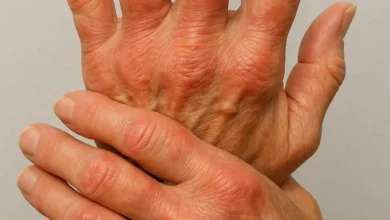Rheumatoid Arthritis and Heart Health: What You Need to Know!
Warning Signs You Shouldn’t Ignore
Symptoms of Cardiac Involvement in RA Patients
When you’re living with rheumatoid arthritis (RA), it’s easy to chalk up every ache or moment of fatigue to your condition. But ignoring warning signs can be dangerous when it comes to your heart. RA significantly increases the risk of cardiovascular disease, and some heart issues come with subtle symptoms that overlap with RA. That’s why recognizing the signs of heart trouble is vital.
Let’s start with some of the key symptoms you should watch out for:
- Chest pain or discomfort: While classic chest pain is a known sign of heart problems, people with RA might experience unusual chest sensations that they might not immediately associate with heart disease.
- Shortness of breath: It could be a red flag if you find yourself winded doing activities you used to handle with ease, like climbing stairs or walking moderate distances.
- Extreme fatigue: Chronic fatigue is common with RA, but sudden or worsening fatigue could signal that your heart is under strain.
- Swelling in the legs, ankles, or feet: Fluid retention might point to heart failure, especially when paired with breathing difficulties.
- Heart palpitations or irregular heartbeat can feel like your heart is fluttering or skipping beats—never ignore them.
- Unexplained nausea or dizziness are severe if paired with chest discomfort.
Because these symptoms overlap with RA or side effects of RA medication, many patients ignore them or attribute them to their autoimmune condition. However, delaying diagnosis and treatment can be life-threatening.

When to Seek Medical Help
So, when should you call your doctor—or rush to the ER?
- If you have persistent chest pain, especially if it radiates to your arm or jaw.
- If you’re feeling breathless even at rest.
- If you’re experiencing any fainting spells or unusual dizziness.
- If swelling in your extremities comes on suddenly or gets worse quickly.
Don’t “wait it out.” Trust your instincts—if something feels off, it’s better to be safe and check it. Keep in mind that heart conditions in RA patients can progress silently. So, even minor discomfort or changes should prompt a conversation with your healthcare provider.
Diagnosing Heart Disease in RA Patients
Common Diagnostic Tools
Once heart issues are suspected, your doctor may recommend several tests. These aren’t just about diagnosing problems—they can also help assess your risk and monitor how RA may impact your heart over time.
Here are the most common diagnostics:
- Electrocardiogram (ECG): This test measures electrical activity in your heart and can identify irregular rhythms or signs of damage.
- Echocardiogram: An ultrasound of the heart that helps visualize heart structure, detect valve problems, and measure pumping function.
- Cardiac MRI or CT scan: These advanced imaging tests provide a closer look at the heart and surrounding blood vessels, helping identify inflammation, plaque buildup, or scarring.
- Blood tests can reveal inflammation levels by checking for markers like CRP (C-reactive protein) and ESR (erythrocyte sedimentation rate). Troponin levels may indicate heart muscle damage.
- Stress test: It tests your heart during exercise. It is sometimes used if you’re showing signs of coronary artery disease.
RA patients might require more frequent cardiovascular screenings compared to the general population. It’s all about early detection and intervention.

The Role of the Rheumatologist and Cardiologist
Managing RA and preventing heart issues requires teamwork between specialists. Your rheumatologist focuses on controlling inflammation and joint health, but they also play a key role in watching for cardiac risks. Conversely, a cardiologist zooms in on your heart function and ensures that any cardiovascular complications are addressed early.
Together, they can tailor a care plan that considers your whole health picture, not just individual symptoms. That’s why it’s essential to be transparent with all your healthcare providers—share all symptoms, medications, and lifestyle habits to help them make informed decisions.
Lifestyle Changes That Can Protect Your Heart
Eating for Joint and Heart Health
Here’s some good news: healthy eating habits that help manage RA symptoms can also support your heart. Think of food as fuel for your immune system and an artery protector.
A few dietary choices that make a big difference:
- Anti-inflammatory foods: Fatty fish like salmon and mackerel, leafy greens, berries, nuts, and olive oil help lower systemic inflammation.
- Limit processed foods and sugar: These can cause arterial inflammation and plaque buildup.
- Cut back on saturated and trans fats: These are linked to increased LDL cholesterol, a major contributor to heart disease.
- Stay hydrated and moderate alcohol: Hydration supports joint function and circulation, while excessive alcohol strains the heart and liver.
The Mediterranean diet is often recommended for people with RA and heart concerns. It’s plant-based, rich in healthy fats, and low in red meat—ideal for reducing inflammation while supporting overall cardiovascular health.
Staying Active Without Overdoing It
Exercise might sound like a chore when dealing with joint pain, but it’s a cornerstone of heart health. The key is choosing the right activities and not overexerting yourself.
Ideal low-impact exercises for RA patients include:
- Swimming and water aerobics: The buoyancy of water takes stress off joints.
- Walking: Gentle on the knees and easy to control pace and intensity.
- Yoga or tai chi: Enhances flexibility and balance while calming the nervous system.
- Stationary biking: Cardiovascular benefits without jarring your joints.
Aim for at least 150 minutes of moderate aerobic activity per week. Even breaking that into small daily sessions counts. Always consult your doctor or physical therapist before starting a new routine, especially if you’re in an RA flare.
Staying consistent is more important than being intense. And remember—movement is medicine.

Medications and Their Dual Effects
RA Treatments That May Affect Heart Health
One of the most complex parts of managing rheumatoid arthritis is dealing with the side effects of the medications used to control it. While these drugs are essential for reducing inflammation and slowing joint damage, some can have unintended consequences on the cardiovascular system.
Let’s look at some common RA medications and how they might impact your heart:
- NSAIDs (Non-Steroidal Anti-Inflammatory Drugs): These include ibuprofen and naproxen. While great for pain relief, long-term use can raise blood pressure and increase the risk of heart attack or stroke, especially in high doses.
- Corticosteroids (like Prednisone): These powerful anti-inflammatories have side effects like weight gain, elevated blood sugar, and higher cholesterol, all of which are bad news for your heart if not carefully monitored.
- DMARDs (Disease-Modifying Antirheumatic Drugs): Methotrexate is one of the most widely used. Interestingly, some studies suggest it protects against heart disease by reducing systemic inflammation.
- Biologics (like TNF inhibitors): These target specific parts of the immune system and have shown promise in reducing inflammation-related heart risks. However, they may also slightly increase the risk of infections, which can complicate heart health.
The bottom line? While medications are essential in keeping RA under control, they can affect other parts of the body, too. Regular heart screenings and honest discussions with your doctors are crucial. Never stop or adjust medication without medical advice—there’s always a risk-benefit balance to consider.
Adjusting Treatment to Reduce Cardiac Risk
If you or your doctor suspects that your RA treatment is harming your heart health, adjustments can be made. Some strategies include:
- Switching to heart-friendly medications: Your rheumatologist might consider replacing specific NSAIDs or corticosteroids with other treatments that don’t carry the same cardiovascular risks.
- Lowering the dose: Sometimes, the side effects are dose-dependent. A slight reduction can make a big difference.
- Adding cardioprotective drugs: To help protect your heart, medications like statins or blood pressure pills may be added to your regimen.
The goal is to treat your RA effectively while also minimizing long-term risks. It’s a delicate dance but achievable with open communication and careful monitoring.
Preventive Strategies That Work
Regular Screenings and Check-Ups
When you’re living with a chronic condition like RA, proactive care is your best defence. You can’t always prevent complications, but you can catch them early—which can make all the difference.
Here’s what your screening checklist should include:
- Annual blood pressure checks
- Regular cholesterol and lipid profile testing
- Blood sugar screenings, especially if you’re on corticosteroids
- Heart-specific tests (like ECGs or echocardiograms) every couple of years or more often if recommended
- Inflammation markers like CRP and ESR to track RA activity
These aren’t just routine procedures. They provide a window into how well your body is handling the dual stress of RA and potential heart disease. Regular check-ups allow your doctors to fine-tune treatments and spot early warning signs before they escalate into bigger problems.
The Role of Stress Management
Here’s something most people overlook: stress can directly affect both RA and heart health.
Chronic stress raises cortisol levels, increases blood pressure, and can trigger flare-ups in autoimmune diseases. And let’s be honest—dealing with RA can be emotionally exhausting. Pain, fatigue, medical bills, and limited mobility can easily wear you down.
That’s why incorporating stress management into your care plan isn’t a luxury—it’s a necessity. Try these proven strategies:
- Mindfulness and meditation: Just 10 minutes a day can reduce inflammation and lower blood pressure.
- Therapy or counselling: Talking to a mental health professional can help you cope with the emotional side of chronic illness.
- Deep breathing and relaxation techniques help calm the nervous system and reduce heart rate.
- Hobbies and connection: Staying socially connected and engaging in enjoyable activities boosts your mood and helps balance stress hormones.
Managing stress isn’t just good for your mental health—it’s a major player in keeping your joints and heart in good shape.
The Importance of Personalized Care Plans
One Size Doesn’t Fit All
Every person with RA is different—and so is their risk for heart disease. That’s why personalized care is so critical. What works for one person might not be practical or safe for another.
Some key factors that influence your care plan:
- Age and gender
- Family history of heart disease
- RA severity and flare-up frequency
- Existing health conditions (like diabetes or high blood pressure)
- Current medications and their side effects
When your healthcare team creates a care plan tailored to your needs, you get the best of both worlds: optimal RA control and heart health protection. That plan should evolve with you as your condition, lifestyle, and health priorities shift.
Coordinating Care Across Specialties
The most successful approach to managing RA and heart health involves a team-based strategy. This usually means:
- Rheumatologist: Leads your RA treatment and monitors joint and immune health.
- Cardiologist: Assesses heart function and risk factors and prescribes appropriate medications.
- Primary Care Physician: Coordinates care, manages overall health, and keeps track of routine screenings.
- Nutritionist or Dietitian: Helps with anti-inflammatory and heart-friendly meal planning.
- Physical Therapist or Fitness Coach: Guides you through safe exercises supporting joint mobility and cardiovascular strength.
By syncing all aspects of care, you minimize overlap, reduce side effects, and optimize your health outcomes.
Real-Life Stories and Case Studies
Case Study: Maria’s Journey from Joint Pain to Heart Health Awareness
Maria, a 52-year-old schoolteacher, had been living with rheumatoid arthritis for over a decade. While she managed her flare-ups with medication and rest, she often dismissed other symptoms—like frequent fatigue, occasional chest tightness, and swelling in her ankles—as just part of her RA.
One day, after climbing a flight of stairs, she experienced such intense shortness of breath and dizziness that she ended up in the ER. After a full cardiac workup, doctors discovered that she was in the early stages of heart failure, exacerbated by long-term inflammation and corticosteroid use.
Maria’s story is not unique. Many RA patients don’t realize how connected their joint health is to their cardiovascular system until it’s almost too late. After adjusting her medication, switching to a Mediterranean-style diet, and starting physical therapy, Maria saw significant improvements—not only in her heart health but also in her energy and quality of life.
Lessons from Real Patients
RA patients who thrive despite the challenges have a few things in common:
- They take symptoms seriously. No ache or pain is too slight to mention to a doctor.
- They prioritize consistent care. Regular appointments and screenings are non-negotiable.
- They listen to their bodies. They know when to push and when to rest.
- They adopt holistic lifestyles. Diet, exercise, mental health—it’s all part of the equation.
These real-life stories serve as powerful reminders that managing RA is not just about pain relief—it’s about safeguarding your entire body, especially your heart.
Future Outlook for RA and Heart Health
Emerging Research and Innovations
There’s good news on the horizon. As research on the link between rheumatoid arthritis and cardiovascular disease expands, so do the treatment options and preventive strategies. Scientists are currently exploring:
- Advanced biologics: Newer medications that more precisely target inflammation pathways without damaging the heart.
- Genetic testing: To identify RA patients most at risk for cardiovascular complications.
- Wearable tech and AI monitoring: Tools that detect heart rhythm abnormalities and alert patients before symptoms become severe.
- Dual-purpose medications: Some drugs being developed aim to treat both RA and heart inflammation simultaneously.
These innovations promise a future where patients can manage RA more safely, with fewer risks to their cardiovascular systems.
What Patients Can Expect Moving Forward
The healthcare industry is increasingly focusing on integrative care. This means RA patients can expect:
- More frequent heart screenings as part of standard RA care.
- Improved access to multidisciplinary teams that coordinate across specialities.
- Personalized risk assessments based on your specific RA profile.
- Better insurance coverage for preventive services that include heart-health diagnostics.
Education is also improving—patients are being empowered with the knowledge to advocate for themselves and recognize signs before things escalate.
Conclusion: Take Charge of Your Joint and Heart Health Today
Living with rheumatoid arthritis is already a complex journey, and the added risk of heart disease makes it even more important to be proactive. But here’s the thing: knowledge is power. When you understand how your joints and heart are connected, you can make wise choices that protect your whole body.
Start by talking with your doctors about your heart health. Ask for regular screenings. Make lifestyle changes—however small—that support your well-being. Eat heart-healthy foods, stay active in joint-friendly ways, and manage your stress.
Don’t wait for a crisis to take your heart seriously. Prevention starts today, and with the proper care plan, you can live a whole, vibrant life—even with RA.
FAQs About Rheumatoid Arthritis and Heart Health
1. Can RA medications cause heart problems?
Yes, some RA medications, especially NSAIDs and corticosteroids, can raise your risk for heart disease. However, others, like certain DMARDs and biologics, may lower that risk by reducing inflammation. Always talk to your doctor about side effects.
2. Are people with RA more likely to have heart attacks?
Absolutely. Studies show that people with RA have up to twice the risk of heart attack compared to the general population. Chronic inflammation plays a significant role in damaging blood vessels and accelerating heart disease.
3. What kind of exercise is safe for RA patients concerned about their heart?
Low-impact activities like swimming, walking, yoga, and cycling are ideal. They help keep your heart strong without putting extra strain on your joints. Always consult your doctor before starting a new workout routine.
4. How often should RA patients get their heart checked?
Most experts recommend yearly screenings for blood pressure, cholesterol, and glucose levels. More frequent heart tests like echocardiograms or ECGs may be needed if you have additional risk factors or symptoms.
5. Is it possible to reverse heart damage caused by RA?
While it’s hard to reverse existing damage, many steps—like lifestyle changes, medications, and regular monitoring—can slow progression and improve quality of life. Early detection is key to better outcomes.
